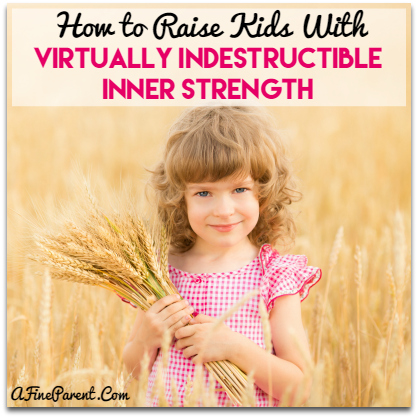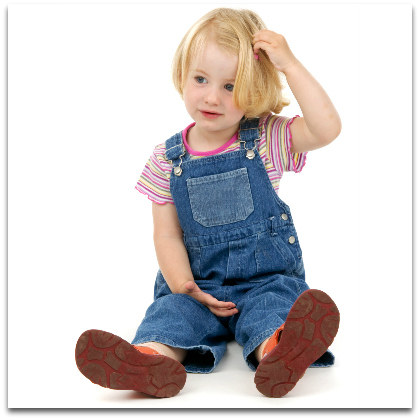 Did you know that Oprah Winfrey had an abused and neglected childhood followed by troubled adolescence peppered with drugs, teenage pregnancy, depression and even attempted suicide?
Did you know that Oprah Winfrey had an abused and neglected childhood followed by troubled adolescence peppered with drugs, teenage pregnancy, depression and even attempted suicide?
Today though, we know her as a larger-than-life figure with more success than most of us can imagine.
And yet, for every Oprah, there are thousands of kids, if not more, who didn’t make it. Oprah’s own half-sister for instance, died of reasons related to cocaine addiction.
Why is this? Why is it that some people have virtually indestructible inner strength that pulls them out of the direst circumstances while others crumble under far less complicated circumstances?
Is this inner strength something we can nurture in our kids?
Maybe our goal isn’t to raise the next Oprah, but can we make sure that no matter what life throws at them our kids will face it like champs and come out stronger for it?
I believe that small everyday experiences help in sculpting us and building that core of inner strength within us.
Inner Strength in Facing Everyday Challenges – A Simple Example
Let me share an experience about my 8 yr old daughter. It’s a rite of passage kind of challenge that all our kids face at some time or the other during their school years – you’ve probably had a similar experience too.
One day in school my daughter had a slight tiff with her friend and playmate. Her friend was apparently more upset than her about the incident. The next day, her friend gathered a few other playmates and instigated them to gang up to confront my daughter.
As my daughter would tell me later, her first instinct at being caught unaware in this way was to either cry and run away from the situation or lash back at them in hurt and anger. A typical flight or fight response to feeling betrayed and singled out.
Instead of immediately reacting though, she took a moment to respond. She pulled her tiny self all straight and calmly stood her ground. She looked her friend in the eye and apologized for unintentionally hurting her. And then as calmly as she could, she pointed out to the others that there were simply no issues between them and her.
I was so proud of this response from her. I’d like to think that all our mom-daughter talks about “being strong inside” helped.
This is not an everyday reaction from a child. Her friends weren’t expecting it. They had expected her to be scared, angry or upset.
The whole situation turned around quickly after that. Within moments they had put the whole thing behind them and were back to playing together again.
That day when she came home, she had this huge smile on her as if she had won a big battle! I couldn’t be happier.
It may seem trivial to us grown-ups, but this was a very significant experience in my daughter’s life – a ‘win’ on top of which future wins can be built. A narrative to pull out in the face of future adversities.
How our kids learn to cope with the minor or major challenges early in their lives lays the foundation of how their personalities blossom out and how they face and handle future life challenges.
We must monitor what lessons they pick up early on– their attitudes and beliefs about themselves and the world, their ability to understand and manage their own thoughts, feelings and actions as well as their ability to be sensitive to and perceptive of others. All of these contribute to enriching their inner strength and preparing them for whatever their future holds.
A beautiful Buddhist saying goes,
It is the treasures of the heart – inner qualities such as spiritual strength, character and humanity – that will ensure the true happiness of the child
So, What Exactly is Inner Strength?
 Being strong from within basically means having a reservoir of resources – knowledge, skills and attitude that help you to confront any difficulties you may encounter.
Being strong from within basically means having a reservoir of resources – knowledge, skills and attitude that help you to confront any difficulties you may encounter.
It means… Not getting overly flustered by changes or fazed by hardships. Not breaking down or giving up easily during tough times. Believing in one’s self and bouncing back from failures. Making choices and tackling problems productively.
Maureen Healy, a popular columnist for Psychology Today and PBS Series speaks of cultivating resilience in kids by cultivating optimism, focusing on strength and building openness to change.
Now, let’s just look at a few scenarios:
- A loves to win. Typically, gets super excited, does a victory dance each time he wins. Hates losing. So, tends to sulk, walk out of the game, or accuse the opponents of cheating whenever he loses. Due to his behavior, his playmates avoid him a lot.
- B is obsessed with a contest and dreams of winning. When she doesn’t actually win, she can’t accept it. Gets extremely dejected, withdraws and becomes morose and is just unable to get over it.
- C is a head taller and substantially bigger than the average kid in his class. He is constantly teased and picked on. One day he decided to reverse the game. He started to use his appearance and physical strength to bully and harass the kids. This stopped the heckling and overnight he became someone powerful and to be feared. But it also got him into lots of trouble with his teachers.
- D has very few friends and is troubled. The ‘popular’ kids call him a nerd because he always does his homework on time, is always well prepared for tests, gets good grades and plays by the rules.
In all of the above scenarios, the kids are operating from a position of depleted inner strength. They either do not possess, are unaware or are defaulting to unhealthy coping strategies in the event of stress or adversity.
Here are some common signs of a lack of inner strength:
- Tantrums, outbursts, lying, bullying, over impulsiveness , low frustration tolerance and inability to handle failing/losing
- Lack of confidence, overdependence, restrictive fears, tendency to give up easily, low motivation and initiative
- Negative feelings and mood swings
- Value conflicts, ethical and moral dilemmas
Well, I admit this is not an exhaustive list. There can be many subtler signs that go unnoticed and are yet manifestations of a not so strong will or core strength.
The essential skills required to build inner strength are:
- Self awareness and self management
- Self belief and positive thinking
- Will power and self discipline
- Problem solving and decision making
- Setting and working towards a higher aim
Is Inner Strength Innate or Can it be Developed?
 Experts say that not everyone is born with the attitude and skills of resilience. It is a learned skill and we parents can teach these skills to our young ones. The earlier these skills are learnt, the stronger they remain embedded and more easily they can be recalled when needed.
Experts say that not everyone is born with the attitude and skills of resilience. It is a learned skill and we parents can teach these skills to our young ones. The earlier these skills are learnt, the stronger they remain embedded and more easily they can be recalled when needed.
We parents cannot shield our kids from all threats or difficulties how much ever we wish for. But what we can do is to see that they develop skills of inner strength and resilience so that they can thrive despite the challenges that life throws at them.
Skills once learnt remain with the children forever. They may remain dormant but they never leave them.
Pierro Ferruci, a psychotherapist and philosopher sums it up beautifully.
Inner strength is an essential resource. We may lose touch with it, yet we can find it again. In dire situations, people bring out their best, their resilience and courage, their practical intelligence, and above all their inner strength.
Moreover, we need not wait for a trauma or challenge in our children’s lives before we train them on how to deal with it. By simply having conversations about stories we hear in the news, or discussing what-if scenarios, we can help our kids pick up some of these tools. Having the repertoire of skills and strategies ready and handy can go a long way in preparing kids resolve the challenges more positively when they do surface.
We, as parents, can ensure this by embracing the following 4 cornerstones of parenting:
1. Aim to raise all rounded kids
Develop their bodies, minds and intellects equally. Focus on their nutrition, exercise and brain development. At the same time, nourish their minds, help them be emotionally strong, comfortable with themselves and prepared to face situations with courage and determination.
In other words along with enriching their physical and intellectual growth we need to nurture their psycho- spiritual health too!
2. Create a conducive environment
Provide unconditional love and an atmosphere of safety and security. Offer stimulation for growth and opportunities to further their potential. Help them discover and express their natural talents and interests.
3. Accept and help our kids accept their uniqueness
Every child has a unique set of strength and flaws. Help them embrace and celebrate their uniqueness. Avoid unrealistic expectations and unnecessary comparisons.
4. Be prepared to walk the tightrope deciding between
- To push or let be!
- To hold or let go!
- To discipline or give freedom!
- To protect them or let them take risks!
- To be actively involved or give them space and privacy!
There is no blanket solution for this. We have to objectively evaluate the needs of the child and the situation on an ongoing basis to decide the appropriate approach at any given point of time.
A Few Guidelines for Instilling Inner Strength in Kids
 Here are a few things we can do to build a strong core of inner strength within our kids –
Here are a few things we can do to build a strong core of inner strength within our kids –
1. Keep the faith
- Low self confidence or self belief originating in childhood is often the root of many maladjustments of later life.
- It is very imperative to help kids deal with insecurities, fears and self doubts early on.
- Believe in them and help them believe in themselves.
2. “I’ll be there for you”
- Constantly assure your kids of your support and understanding, though not necessarily approval.
- They should feel comfortable in confiding in parents and turning to them in times of need.
3. “You can do it, try it”
- Encourage independence (practical and emotional) and personal responsibility.
- Motivate them to learn to fight their own battles and seek challenges without giving up easily.
4. “The way I feel…”
- Help children identify theirs as well as others different emotions, moods and reactions.
- Teach them to express and manage their feelings appropriately.
- Help develop compassion and empathy for others
5. Act not react
- Assist them to develop better tolerance to frustration.
- Guide them to hit the pause button when extremely upset or angry so as to be in a better control of self and situation.
6. Failures & disappointments are part & parcel of life
- Prepare them for the ups and downs of the rollercoaster called ‘Life’.
- Remind them again and again that…
- “It’s O.k. to fail if you have tried your best.”
- “You win some, you lose some.”
- “Try again…. What can you do differently this time?”
7. Balance idealism and realism
- Instill positivity and optimism yet not shield them from the realistic aspects of life
- Encourage rational thinking- Eg: people and circumstances are not always fair or do not always reciprocate equally in kind.
8. A sense of gratitude
- Help them aim high and encourage self improvement but also help them accept whatever they achieve with an attitude of gratitude.
- This is so that they do not operate always from a standpoint of dissatisfaction and incompleteness.
9. Be connected
- Encourage them to be warm, friendly and well mannered.
- Stress the importance of proactively seeking and sustaining meaningful relationships and building fine support network.
10. Time is the best healer
- Prod them to hang on, to not give up easily.
- Teach them how the passage of time can change their view and perspective or intensity of experience.
11. Change thoughts, change feelings
- Point out the relationship between thinking and experiencing.
- Clarify how their approach to a situation can make it good or bad and how managing their quality of thoughts effectively can produce a positive and desired state of mind.
12. Stay engaged
- ‘Idle mind is the Devil’s workshop’. Encourage them to keep their minds engaged productively and release negative energies by finding the right balance for your child between organized activities and free play.
13. I lead, you follow
- Be a role model and set good example; display your inner strength and resolve.
- Hands down beats the “do as I say, not as I do” approach to parenting!
14. Happiness in your hands
- Teach them to avoid basing their happiness on external conditions- person, object or situation.
- Help maintain a balance; not let circumstances dictate mood swings from extreme joy one moment to absolute despondency in the other.
- Remind them that they can choose to think, feel or act in a certain away regardless of external factors
15. Inspired living
- Encourage positive reading, healthy television/ movie / internet viewing and uplifting company.
- Help develop early in life, healthy patterns of thinking and functioning and set focused goals.
- Expose them to inspiring incidents, real life heroes and their stories.
- Create an enriched inner atmosphere with a clear universal and personal value system that will stand by them in more challenging times.
The 2-Minute Action Plan for Fine Parents
For our quick contemplation questions today –
- Do you focus as much on nourishing the physical and mental strength of your kids?
- Do you take the time to look beyond the child’s expressed behavior to look into the deeper motivations?
- Does your child display healthy inner strength? What is the one thing you could focus on right now to strengthen that core?
- What is your child’s biggest weakness as you see it? How can you help your child get stronger in this area without shaming or attacking them?
- Are you constantly working on improving your own inner strength?
The Ongoing Action Plan for Fine Parents
- Spend some time together with kids reading about or looking up on the internet the inspiring stories about people who overcame obstacles, specially as children
- Emphasize the value of learning from mistakes and bouncing back from failures
- Empower them by allowing them to test their limits, letting them challenge themselves and come out of their comfort zone
- Help them create a positive inner dialogue so that they have good self belief and become self motivated.
- Above all, let’s resolve as parents to be truly connected to our kids so that we are perceptive to their needs, feelings or influences. For holistic growth and development let’s help kids develop effective coping mechanisms, a relaxed lifestyle along with good basic habits of sleeping and eating. Let’s equip them with tools necessary for inner strength and resilience. Let’s raise them to grow into strong, healthy and happy individuals!
Great article, if the parents follow this article, then, a child will become a larger-than-life figure with more success as you said.
Fantastic article! Well written with great advice! I especially appreciated the part about balancing idealism with realism. So many of us identify with either one worldview or the other, but taking both into account is so important for overall balance and ‘bigger-picture’ thinking. Thank you for sharing this!
Fantastic insight, encouragement and advice. Especially for those of us who didn’t have enough healthy encouragement and positive parent role models, your words are very comforting. I am looking forward to the 6 part series 🙂
Thank you for the kind words, Danielle! So happy that you’ve join our community – welcome aboard!
Danielle, I am really glad that the write up had a positive impact on you. Just want to say…very often, the knowledge we acquire and experiences we encounter (good & bad) in our journey of life makes us richer and more mature. So, wish you all the best in your personal journey of finding true inner strength as well as in guiding the little ones!
Great piece Sunita. Funny enough, I’ve been practicing most of the skills itemized here. I believe in teaching children personal responsibility, a ‘can-do’ attitude, faith, trust, gratitude and empathy amongst others very early and I’m glad to say they’ve started practicing these timeless values. We must be intentional about how we raise our children. Because it’s what they’ve learned from home that they’ll display outside, that’s not to say they can’t pick stuffs from school or elsewhere. But if we’re observant, we can identify those odd stuff and tactfully thrash them. Keep up the good work, you are doing a great job
Thanks for the wonderful comment, Oluwakemi! I couldn’t have said it better myself. As you said, it all boils down to one thing: being intentional about how we raise our children — in what we teach and how we teach it!
Good luck to you in your parenting journey!
Thank you, Oluwakemi. You are absolutely right. Since we are instrumental in bringing our children into this world, it is our primary responsibility to raise them in a manner such that they are prepared to take on what life offers them. I am so glad your efforts have paid off and your children are practicing these timeless values – as you put it. I am sure it can be very fulfilling!
Great article.. I’ll definitely try to be a better mom now onwards.
Thanks, Ruchi. Keep the faith. All the very best to you!
Thank you Sunita and Sumitha for a brilliant article. I learnt a lot from this and will keep these in mind. I was happy to read through this and although I could have more self confidence at times I felt, myself, like I have a lot of inner strength so that made me happy! And will try our best to raise our son to be happy and confident – recently at a friends place her little girl had the worst tantrum I’ve ever witnessed. She didn’t want her mum or dad. She was in her room crying on her bed and our little man kept going into her trying to give her a hug or bring her things from around the house trying to cheer her up. I was so proud and astounded by him showing so much empathy for a two year old. They are amazing little people, more intuitive than us a lot of the time I think, and if we can honour that and help them grow into the best versions of themselves I think we’ve done well. Thanks again – will be bookmarking this 🙂
Aww… that’s so sweet! Don’t you just love those surprise moments when we get a glimpse into the beautiful heart our kids carry? I try to hang on to those little images in my mind for the times when my daughter is driving me up the wall 🙂 Wish you the very best in raising your son into a wonderful little man he promises to be!
Sure do and yes…they make the challenging moments much easier if we remember the sweet ones! Looking forward to next week’s post 🙂
Tracy, I am so happy to know you could learn from the article. It’s so true that “helping our kids to grow into best versions of themselves ” is what ultimately parenting is all about. I couldn’t have put it better myself! Your son seems to be an amazing person. Hope you have a great journey ahead!
Thank you so much for writing this! We try to instill this in our kids all the time, and it’s always a boost to read it in words. It helps us refocus our efforts and remember to instill it in ourselves, as well. This is wonderfully written.
Thanks for the wonderful comment, Emily. That is one of the main reasons I maintain this blog as well… wonderfully written articles like this are a great way for me to keep these ideas in the forefront in my mind, so they color my interaction with my daughter each day. So glad to hear it resonated with you as well!
I am so glad you liked it, Emily! As you have rightly said, it is very important to keep striving to instill these ideas in ourselves first before we do it in our kids. More so as we know that kids learn better by seeing us do than merely hearing us say!
Great article! Thanks for sharing your wisdom!
Thanks for your kind words, Laura. Glad you liked it!
Thank you so much, Laura. It’s simply wonderful to be able to share my ideas and experiences with people who can relate to it!
Wonderful article, thank you for your time writing and sharing it. So important to “nourish” their emotional health as you say.
I am really glad you liked the article, Caitlin. Thank you…. for taking time out for posting that wonderful comment. Really appreciate it.
This isnan incredible valueable article. Much love to you. Thank you.
I appreciate those wonderful words of encouragement, Brittany. Thanks 🙂
Brittany, thank you so much. Loved to share my thoughts with you. Am so glad you found it ‘valuable’!
Sunita,
I enjoyed your article and you are right on. Thank you for your dedication to helping parents help their children grow up strong. When the winds of difficulty blow their way, they will bend but not break. Keep up the good work.
Ray
So well said — “Bend but not break in difficult winds” — I love that. It will stay with me for a while. Thanks, Ray!
Thank you Ray for your appreciation & encouragement. Loved the way you put it ” bend but not break”. That’s exactly what I wanted to convey. Feels great that I could reach out & connect so easily with like minded people! So I guess I have to say – Thank you too, Sumitha!:)